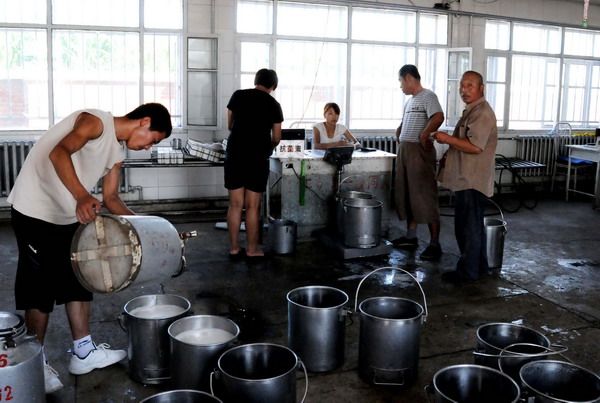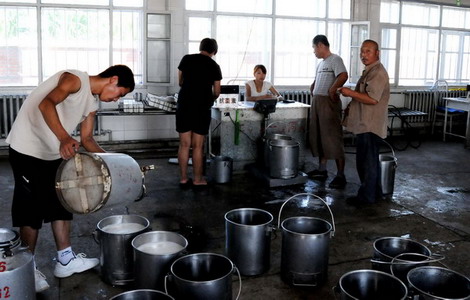Farmers, Nestle in milk payment row
Updated: 2011-10-26 07:50
By Zhou Huiying and Qiu Bo (China Daily)
|
|||||||||||
|
 Farmers deliver milk to a collection spot for Nestle's subsidiary in Shuangcheng, Heilongjiang. [Photo by Cheng Zilong/Xinhua]
|
SHUANGCHENG, Heilongjiang - Shuangcheng Nestle Co, a subsidiary of Nestle SA, said on Tuesday it would improve its measurement practices in response to several farmers' claims that the Swiss food giant had been collaborating with local vendors to shortchange them for years.
The dispute centers on milk that farmers deliver to Nestle facilities.
Wang Lixin, a 45-year-old farmer in Shuangcheng, said she delivered 1,450 kilograms of raw milk to Nestle last month, but the company paid her about 1,000 yuan ($157) less than the agreed-upon price.
According to the original agreement, Wang's milk should be sold to the dairy giant's local branch for 3 yuan per kg, in this case 4,350 yuan.
However, after the milk was weighed, Wang was told it was worth only 4,100 yuan. She said company officials also told her the milk contained an excessive level of an antibiotic and withheld another 800 yuan as a penalty.
Wang said the company never explained why her milk fell short of standards.
"This has happened every month since 1996 and I've gotten used to it," she said.
Most dairy farmers in Shuangcheng, Heilongjiang province in Northeast China, have suffered from such "unfair treatment" from the Nestle plant over the previous decade or longer, Xinhua News Agency reported over the weekend.
Local dairy farmers told Xinhua "the company juggled their scales and intended to withhold a fraction from farmers for years".
The farmers also complained that the company said some of their raw milk was substandard without further explanation and that local authority forbade them from selling milk to other dairy companies outside Shuangcheng.
The company's branch issued their standards for milk quality in 1996, six years after it established its base in Shuangcheng. The company runs 74 collection spots in the city.
On Tuesday, Shuangcheng Nestle Co said it would improve it weighing procedures.
The announcement said the local government would provide new scales to each collection spot by Wednesday to guarantee fairness and the company would ensure that farmers' milk was fairly weighed.
It also said the government would enhance supervision of the collection spots and the company would set up a hotline for farmers' complaints.
Shuangcheng Nestle Co said there were two other dairy companies in the city and farmers were not forced to deliver to Nestle.
A pact signed in 2002 between the city and Nestle said that Shuangcheng, which is home to more than 20,000 dairy farmers, should have no other dairy firms and that all milk produced in the city must be delivered to Nestle, Xinhua reported.
He Tong, spokeswoman for Nestle China, said on Monday that the company would work with the local government to investigate the problems.
She said Nestle had contributed to the city's economic and social development over past 20 years.
According to the local city farming bureau, Nestle paid 280 million yuan in tax to the local government last year, while the county's total tax income was 1.6 billion yuan.
However, some local dairy farmers, such as 43-year-old Fu Peng, were taking their business elsewhere, secretly selling milk to buyers outside the city. "Though the offered price is not as favorable as Nestle's, I always got fully paid on time."
Wang Dingmian, chairman of the Guangzhou Dairy Association and a key figure in the national dairy industry, said the local government was responsible for protecting farmers' interests in conflicts with dairy firms.
"If they don't help dairy farmers negotiate with the companies, the farmers' interests have no way of being protected," he said.
Hot Topics
New sex education textbooks were introduced to pupils in Shanghai on Monday after numerous debates on early-age sex education in China.
Editor's Picks

|

|

|

|

|

|







